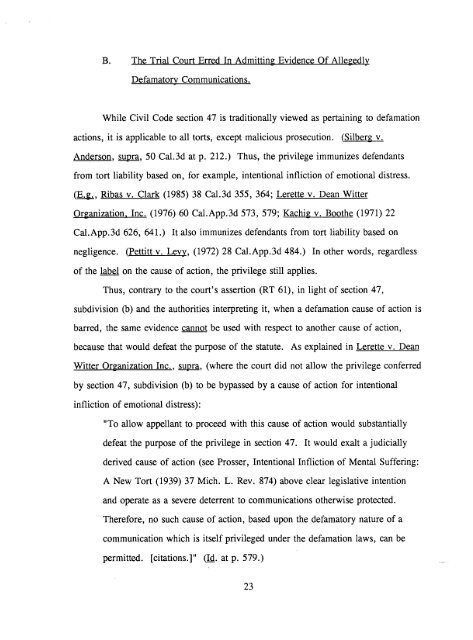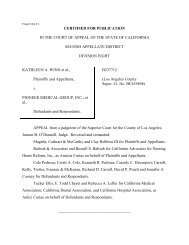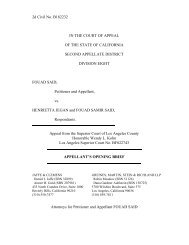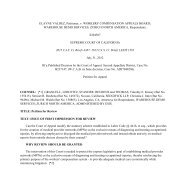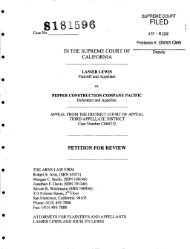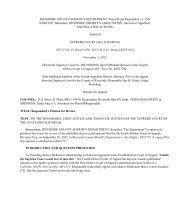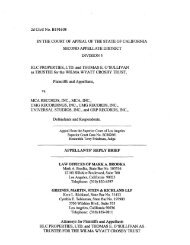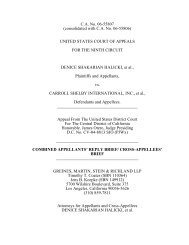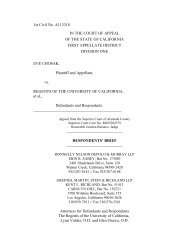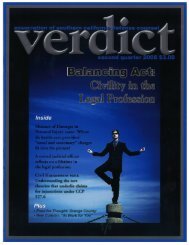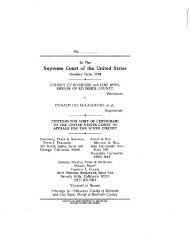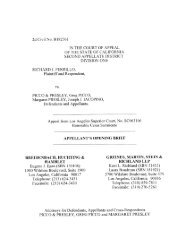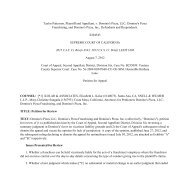Amylou R. v. County of Riverside Appellant's Opening Brief
Amylou R. v. County of Riverside Appellant's Opening Brief
Amylou R. v. County of Riverside Appellant's Opening Brief
You also want an ePaper? Increase the reach of your titles
YUMPU automatically turns print PDFs into web optimized ePapers that Google loves.
B. The Trial Court Erred In Admitting Evidence Of Allegedly<br />
Defamatory Communications.<br />
While Civil Code section 47 is traditionally viewed as pertaining to defamation<br />
actions, it is applicable to all torts, except malicious prosecution. (Silberg v.<br />
Anderson, supra, 50 Cal.3d at p. 212.) Thus, the privilege immunizes defendants<br />
from tort liability based on, for example, intentional infliction <strong>of</strong> emotional distress.<br />
(E.g., Ribas v. Clark (1985) 38 Cal.3d 355, 364; Lerette v. Dean Witter<br />
Organization. Inc. (1976) 60 Cal.App.3d 573, 579; Kachig v. Boothe (1971) 22<br />
Cal.App.3d 626, 641.) It also immunizes defendants from tort liability based on<br />
negligence. (Pettitt v. Levy, (1972) 28 Cal.App.3d 484.) In other words, regardless<br />
<strong>of</strong> the label on the cause <strong>of</strong> action, the privilege still applies.<br />
Thus, contrary to the court's assertion (RT 61), in light <strong>of</strong> section 47,<br />
subdivision (b) and the authorities interpreting it, when a defamation cause <strong>of</strong> action is<br />
barred, the same evidence cannot be used with respect to another cause <strong>of</strong> action,<br />
because that would defeat the purpose <strong>of</strong> the statute.<br />
As explained in Lerette v. Dean<br />
Witter Organization Inc., supra, (where the court did not allow the privilege conferred<br />
by section 47, subdivision (b) to be bypassed by a cause <strong>of</strong> action for intentional<br />
infliction <strong>of</strong> emotional distress):<br />
"To allow appellant to proceed with this cause <strong>of</strong> action would substantially<br />
defeat the purpose <strong>of</strong> the privilege in section 47. It would exalt a judicially<br />
derived cause <strong>of</strong> action (see Prosser, Intentional Infliction <strong>of</strong> Mental Suffering:<br />
A New Tort (1939) 37 Mich. L. Rev. 874) above clear legislative intention<br />
and operate as a severe deterrent to communications otherwise protected.<br />
Therefore, no such cause <strong>of</strong> action, based upon the defamatory nature <strong>of</strong> a<br />
communication which is itself privileged under the defamation laws, can be<br />
permitted. [citations.]" (Id. at p. 579.)<br />
23


